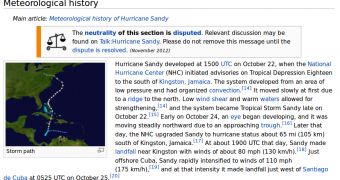Wikipedia started out as an encyclopedia, but it was never a direct replacement or equivalent, now even more so. That's because a page on Wikipedia can be created and published in minutes, this immediateness means hot topics can be covered as they happen.
This happens quite regularly and it did with Hurricane Sandy as well. As long as several guidelines are followed, pages covering unfolding events are allowed on the site.
What's more, they are quite popular. People looking for a neutral, comprehensive look at just the facts turn to Wikipedia, not to any news organization.
This is due to the inherent trust in Wikipedia's objectiveness first and foremost.
Of course, anyone who knows how the site is put together knows that this is an illusion at best, nothing can be truly objective, especially something created by regular folks.
This is why the hurricane's page had no mention of climate change at all since it was first created and for four days after the hurricane had hit the US.
This wasn't by mistake, it was a concerted effort by one editor who was the most active on that page. He kept the info updated, he curated what others added and he made sure any mention of climate change be swiftly deleted.
Why, you may ask. Well, because he doesn't "believe" in global warming. And if he didn't believe it, there would be no mention of it on the page.
Popular Science has a recount of how he edited out changes that mentioned the topic, though if you visit the Wikipedia page for Hurricane Sandy, incidentally, the first result on Google though it's not in the first 10 pages of results on Bing, you will notice that the topic is covered now.
This could be viewed as a failing on the part of Wikipedia, but it's not really. Because "Wikipedia" is really what we make of it. It's easy to stay to the sides and criticize those that get involved.

 14 DAY TRIAL //
14 DAY TRIAL //